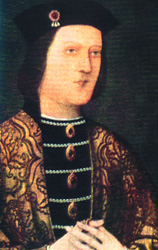Edward IV
About Edward IV

First King of the House of York. Born 1441. His grandfather was Richard, son of Edmund, fifth son of Edward III.; and his grandmother was Anne, great grand-daughter of Lionel, third son of the same king. Elected King of England, March 5th, 1461; but before his Coronation was obliged to take the field, and fight the battle of Towton as aforesaid (March 29th, 1461). Crowned at Westminster three months later, June 29th, 1461.
Among the ablest, the most ruthless and pitiless of the leaders of that civil war, by which he secured the crown. There is "no reasonable doubt" that Henry VI., Edward, Prince of Wales, that king's son, and the Duke of Clarence - "false, fleeting, perjured Clarence," his own brother (of the traditional butt of Malmsey) - were murdered by King Edward IV.'s orders.
The ancient baronage of England, according to history, was never more powerful than after the battle of Towton. More powerful than any of those barons who then overawed the crown was he who for a while became master of England: Warwick, the "King Maker," killed at the battle of Barnet. The "Last of the Barons," he. King Edward IV. is said to have met Prince Edward's cry for mercy at the battle of Tewkesbury with a blow from his gauntlet. He was stabbed by Yorkist lords, to whom the act had seemed invitation to the deed.
"A goodly personage and very princely to behold," was written of King Edward IV.; "of visage lovely, of body mighty, strong, and clean made"; who courted and married Elizabeth Woodville (widow of Sir John Grey), and had to mistress Jane Shore, one, 'tis said, of many concubines, his thoughts being much employed upon "the ladies, on hunting, and dressing."
His winning manners and carelessness of bearing secured him a popularity which was denied to nobler kings. He was not particular as to some of the companions of his leisure, and mixed familiarly with all classes, at all events towards the close of his reign.
To the dissoluteness of his life was attributed his comparatively early death at the age of forty-one. He was buried at Windsor, 1483. There his corpse was discovered undecayed in 1789; "his dress nearly perfect, as were the lineaments of his face." More important than all, Caxton set up his printing press in the Almonry of Westminster in this king's reign.